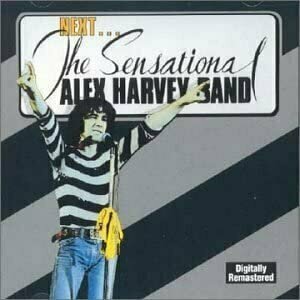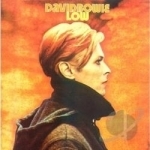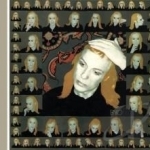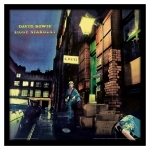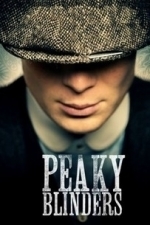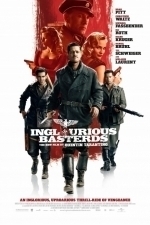Search

Visionaire: The Ultimate Art and Fashion Publication
Celia Dean and James Kaliardos
Book
A publishing experiment that began in 1991, Visionaire has taken the shape of everything from a...

Escape: The Heyday of Caribbean Glamour
Book
A nostalgic celebration of the glamour of warm-weather destinations in the Caribbean and Florida,...
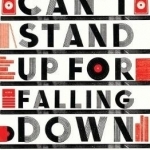
Can't Stand Up for Falling Down: Rock'n'roll War Stories
Book
Now collected in a single volume for the first time, journalist Allan Jones selects his favourite...
Joe Elliott recommended Next by The Sensational Alex Harvey Band Rock in Music (curated)
Karl Hyde recommended Low by David Bowie in Music (curated)
Darren Fisher (2465 KP) rated Taking Tiger Mountain (By Strategy) by Brian Eno in Music
Dec 18, 2020 (Updated Jan 15, 2021)
Eno On Peak
In the 80's I got into Brian Eno via Talking Heads (with the excellent Remain in Light alvum) and David Bowie (Low, Heroes and Lodger), rather than through early Roxy Music.
My first introduction to Eno's solo work was the compilation More Blank Than Frank in 1986, which after listening to, was enough to convince me that I really needed to check out more of his work. I found Taking Tiger Mountain on cassette in the bargain bins at Our Price (I think). No inlay card but it was going cheap. Taking a punt I got it home and was instantly blown away. Musically upbeat for most of its duration, the lyrics told dark, humorous and downright weird tales about espionage, Limbourg Asylum and the rape of a woman by a crazed machine. There's also a lot of references to China (as the album title suggests).
So obssessed by this album I once recycled my smashed up electric guitar body in to a 'skinning up' table (with coaster bed legs so you could push it from person to person). The main centrepiece of this 'table' was a big mound of wax which I attempted to mould into my own Tiger Mountain... Damn the drugs were good back then hahaha 😎✌
Album Highlights:
Burning Airlines Give You So Much More
Third Uncle
The True Wheel
My first introduction to Eno's solo work was the compilation More Blank Than Frank in 1986, which after listening to, was enough to convince me that I really needed to check out more of his work. I found Taking Tiger Mountain on cassette in the bargain bins at Our Price (I think). No inlay card but it was going cheap. Taking a punt I got it home and was instantly blown away. Musically upbeat for most of its duration, the lyrics told dark, humorous and downright weird tales about espionage, Limbourg Asylum and the rape of a woman by a crazed machine. There's also a lot of references to China (as the album title suggests).
So obssessed by this album I once recycled my smashed up electric guitar body in to a 'skinning up' table (with coaster bed legs so you could push it from person to person). The main centrepiece of this 'table' was a big mound of wax which I attempted to mould into my own Tiger Mountain... Damn the drugs were good back then hahaha 😎✌
Album Highlights:
Burning Airlines Give You So Much More
Third Uncle
The True Wheel
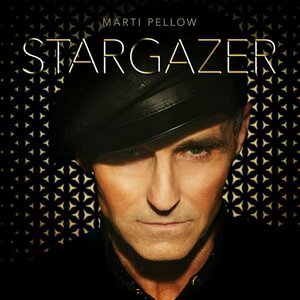
Stargazer by Marti Pellow
Album
'Stargazer' is the latest instalment in a remarkable solo career that's seen Pellow embark on a new...
Daniel Boyd (1066 KP) rated The Rise And Fall Of Ziggy Stardust And The Spiders From Mars by David Bowie in Music
Nov 2, 2017 (Updated Oct 26, 2018)
Ziggy Played Guitar...
Say what you want about David Bowie, whether you love him or hate him, it’s impossible to deny that there was no one else quite like him. A few have tried to emulate his genius over the years, such as Lady Gaga and Robert Smith, but no one will ever be as effortlessly unique and groundbreaking as Bowie. This album influenced so much that came after and while it wasn’t the first glam rock concept album, it is one of the best. It works as a concept album, as an overall complete piece of art and yet the songs also work on their own on an individual basis. This album truly sounds as if it was recorded in a technologically advanced studio in another solar system on the other side of a black hole by a higher being. If Stanley Kubrick ever made a glam rock record, this would be it. Yet it still has that air of raw emotion, as every vocal recording was completed in one take. There is a constant ominous atmosphere all through this album, even during the record’s more upbeat, joyous moments such as Starman. This threat is never clearly defined, rather it is felt through Bowie’s vocal performance and gives us a sense of some kind of upcoming impending doom, without clearly stating it, which in and of itself is a stroke of genius. There is also a juxtaposition present in the album, in that although the majority of the musical arrangements are odd and out of place for a rock ‘n roll album, giving a deliberate ‘alien,’ feel to the compositions present on the album, there is also an undeniable sense of humanity that is felt through Bowie’s voice and this oxymoron garnishes an already awesome sounding album with yet another emotion that is thrust at the listener. Although it is widely debated whether this record was intended to be a concept album, if you follow the narrative and fill in the blanks somewhat you can piece together the tale of a band that reached their prime and eventually blew up and committed rock ‘n roll suicide. This album was the genesis of so much genius to follow and it was all born from one man’s zany imagination.
Rat (1 KP) rated Peaky Blinders - Season 1 in TV
Mar 28, 2018
Forget everything you think you know about period drama
It would be easy to dismiss Peaky Blinders as just a British drama. It would be easy to dismiss it as just a period piece. It would be easy to claim that it was just a British Boardwalk Empire. You'd be so wrong to do so.
Every part of Peaky Blinders is perfection. From the superb acting of its regular cast (Cillian Murphy on a tv show? Sign me up!) to a roster of featured guests (Sam Neill? Tom Hardy? Adrien Brody? Who did the casting director sell their soul to, anyway?) to the use of colour and an outlaw music soundtrack that shouldn't work, but does (Nick Cave? PJ Harvey? Tom Waits? David Bowie? On a period drama? What is this? Freaking genius, that's what.)
Shortly after the end of the first World War, a family of Irish gypsy (their word, not mine) - blooded Birmingham bookmakers tries to recover from the horrors of that war and build up their business. Second oldest, Tommy Shelby (played expertly by Cillian Murphy who manages to play a gangster who is both ruthless and fragile with the ability to break your heart with a single look), came back from the war broken by his experiences, but determined to rise far beyond the limitations of his Small Heath upbringing. Not only does he have the expected clashes with those who want to keep him from growing his business (both criminal rivals and the police) but he has a family to run (with all the interpersonal conflicts that entails). All of this is set against a backdrop of political turmoil from the IRA and the rise of communist sympathy in the UK.
You shouldn't like Tommy Shelby, but he is written and acted so well that you won't be able to not like him. The same can be said for older brother, Arthur, younger siblings John, Ada, and Finn. If you don't love Aunt Polly, then you must have a problem with strong female characters.
Steven Knight has taken a world told to him through family legend and turned it into a world that you will be eager to inhabit an hour (or, if you're like everyone I know, a season) at a time. He writes a period drama that doesn't feel dated. The characters and their struggles are as relevant today as they were nearly a hundred years ago.
Take a chance on the show with the weird name and discover why there are very few casual Peaky Blinders fans. There's a reason why the late, great David Bowie was a huge fan and made sure that they would have a song from his last album before he died. There's a reason the show's dated fashion and hairstyles are making a comeback, why Peaky Blinders pubs and pub nights are popping up all over. It's that good. Check it out for yourself.
Every part of Peaky Blinders is perfection. From the superb acting of its regular cast (Cillian Murphy on a tv show? Sign me up!) to a roster of featured guests (Sam Neill? Tom Hardy? Adrien Brody? Who did the casting director sell their soul to, anyway?) to the use of colour and an outlaw music soundtrack that shouldn't work, but does (Nick Cave? PJ Harvey? Tom Waits? David Bowie? On a period drama? What is this? Freaking genius, that's what.)
Shortly after the end of the first World War, a family of Irish gypsy (their word, not mine) - blooded Birmingham bookmakers tries to recover from the horrors of that war and build up their business. Second oldest, Tommy Shelby (played expertly by Cillian Murphy who manages to play a gangster who is both ruthless and fragile with the ability to break your heart with a single look), came back from the war broken by his experiences, but determined to rise far beyond the limitations of his Small Heath upbringing. Not only does he have the expected clashes with those who want to keep him from growing his business (both criminal rivals and the police) but he has a family to run (with all the interpersonal conflicts that entails). All of this is set against a backdrop of political turmoil from the IRA and the rise of communist sympathy in the UK.
You shouldn't like Tommy Shelby, but he is written and acted so well that you won't be able to not like him. The same can be said for older brother, Arthur, younger siblings John, Ada, and Finn. If you don't love Aunt Polly, then you must have a problem with strong female characters.
Steven Knight has taken a world told to him through family legend and turned it into a world that you will be eager to inhabit an hour (or, if you're like everyone I know, a season) at a time. He writes a period drama that doesn't feel dated. The characters and their struggles are as relevant today as they were nearly a hundred years ago.
Take a chance on the show with the weird name and discover why there are very few casual Peaky Blinders fans. There's a reason why the late, great David Bowie was a huge fan and made sure that they would have a song from his last album before he died. There's a reason the show's dated fashion and hairstyles are making a comeback, why Peaky Blinders pubs and pub nights are popping up all over. It's that good. Check it out for yourself.
Gareth von Kallenbach (980 KP) rated Inglourious Basterds (2009) in Movies
Aug 9, 2019
Should we be allowed to laugh at brutality? Is there room for comedy in a film about the Second World War? These are just some of the questions Quentin Tarantino’s latest film “Inglorious Bastards” is sure to bring to mind.
“Inglorious Bastards” is composed of two intertwined stories broken into chapters combining fictitious and factual historic events. The two stories, the tragic tale of orphaned Jewish girl Shosanna (Mélanie Laurent) and that of an oddly funny group of American soldiers, called “the Bastards”, create introspections into the meaning of glory, destruction, and propaganda.
Familiar faces are scattered throughout the film from creator of “the Office” B.J. Norvak to “Austin Powers“ star Mike Myers. The standout performance of Lieutenant Aldo Raine, played by the always-evolving Brad Pitt, is both comical and clever and the role of Nazi Colonel Hans Landa, Christoph Waltz, is so evil that, within the scope of the film, he some how manages to overshadow Hitler.
While the film is visually graphic, it is the ideas of violence rather than explicit visuals that litter the film. These violent scenes, from scalping to strangulation, are more dramatic than visually accurate.
The film did drag in parts such, as the dark Cinderella-like bar scene, and there was definitely room for further character development for “the Bastards”, yet the sly structure of the film shatters these minor faults but keeping viewers completely invested in the plotline.
“Inglorious Bastards” mixes classic film elements with techniques hauntingly David Lynch in style. From elements of television westerns to the hauntingly familiar sound of David Bowie, Tarintino has created a new way of looking at the past, all while using a time generally perceived as too awful to mention as a background for laughter.
Twisted, tortured, glorious and not “Inglorious Bastards” delivers as a film bound to become classic Tarantino. Fans will be elated and those who oppose the film’s adult themes will not walk away without at least thinking about the meaning of this one-of-kind feature.
“Inglorious Bastards” is composed of two intertwined stories broken into chapters combining fictitious and factual historic events. The two stories, the tragic tale of orphaned Jewish girl Shosanna (Mélanie Laurent) and that of an oddly funny group of American soldiers, called “the Bastards”, create introspections into the meaning of glory, destruction, and propaganda.
Familiar faces are scattered throughout the film from creator of “the Office” B.J. Norvak to “Austin Powers“ star Mike Myers. The standout performance of Lieutenant Aldo Raine, played by the always-evolving Brad Pitt, is both comical and clever and the role of Nazi Colonel Hans Landa, Christoph Waltz, is so evil that, within the scope of the film, he some how manages to overshadow Hitler.
While the film is visually graphic, it is the ideas of violence rather than explicit visuals that litter the film. These violent scenes, from scalping to strangulation, are more dramatic than visually accurate.
The film did drag in parts such, as the dark Cinderella-like bar scene, and there was definitely room for further character development for “the Bastards”, yet the sly structure of the film shatters these minor faults but keeping viewers completely invested in the plotline.
“Inglorious Bastards” mixes classic film elements with techniques hauntingly David Lynch in style. From elements of television westerns to the hauntingly familiar sound of David Bowie, Tarintino has created a new way of looking at the past, all while using a time generally perceived as too awful to mention as a background for laughter.
Twisted, tortured, glorious and not “Inglorious Bastards” delivers as a film bound to become classic Tarantino. Fans will be elated and those who oppose the film’s adult themes will not walk away without at least thinking about the meaning of this one-of-kind feature.
